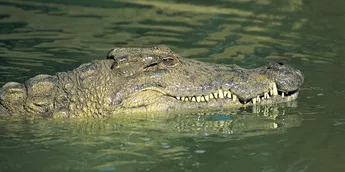Why crocodiles and alligators are said to be immortal creatures that don’t die

Is it true that crocodiles and alligators are immortal creature that do not die?
Alligators and crocodiles are some of the few species that exhibit negligible senescence, meaning they do not biologically age.
Are crocodiles and alligators immortal?
Normal species like humans will show signs of decreased functionality with age, such as slowed reproduction, rising death rates, and decreased agility but not alligators and crocodiles.
These species have negligible senescence which means they do not die old age but they will die from other causes, such as illness or predators. Turtles also exhibit negligible senescence, they age unusually slowly. An example of this is one famously old tortoise named Jonathan is thought to be approaching 200 years of age.
Animals with negligible senescence remain growing for the duration of their lives, but eventually they run out of food to sustain their expanding metabolisms, which results in starvation.
Although determining the age of an alligator or crocodile is difficult, there are methods available to help arrive at a good estimate. The largest species of crocodile, C. porosus, is thought to live an average of 70 years, making it the oldest species still in existence. Only twenty years ago, a crocodile kept in captivity in Russia passed away after more than a century of life.
Evidence, however, points to crocodilians’ mortality and natural ageing processes-albeit with a slower rate of ageing. They are not eternal. An older, weaker croc is more likely to starve to death in the wild, even when kept in captivity, they eventually pass away, after a relatively long life.
Sadly, crocodiles and alligators do not hold the secrets of immortality.





